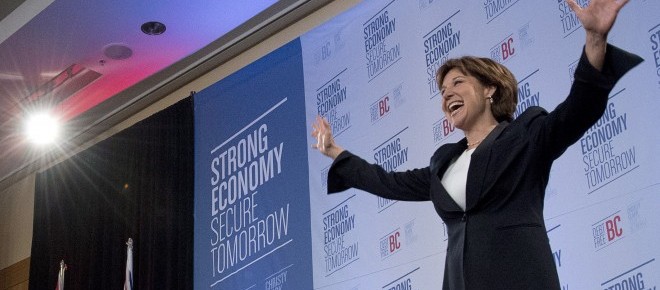Did Christy Clark really beat the odds?
Tease the day: Polls told us the B.C. premier would lose, but why should we believe them?
Jonathan Hayward/CP
Share

Christy Clark beat the odds yesterday, you know. The B.C. premier, who’d been written off for dead, scored an upset, a come-from-behind victory for the ages that enshrined her as a provincial political legend.
There’s an alternate theory here: Maybe Clark, whose Liberals secured 50 seats in the legislature after the votes were counted—a fourth consecutive majority government for the party—simply won an election by getting out the vote and doing it more efficiently than her opponents. Maybe.
The common storyline, the one about stunning upsets and comebacks, is based on the notion that the Liberals were 20 points behind the NDP when the campaign began, and still several points down on the eve of the election. The Liberals never led a poll. They always trailed. They were supposed to lose. Except they didn’t.
Immediately, tracking polls and the pollsters behind them were in the spotlight, because they all got it wrong. It’s all reminiscent of the 2012 Alberta election, some are saying, where polls failed to track a last-minute dash to Alison Redford’s Progressive Conservatives that sealed the fate of the apparently favoured Wildrose Party.
Clark, for her part, thinks “people are going to re-examine the truthfulness of polls.” Hamish Telford, a political scientist at the University of the Fraser Valley, says pollsters “are going to have come clean and give us an explanation.”
Maybe so. But no matter the problems with methodology, accuracy, and overall worth of horse-race obsession, these kinds of polls are sticking around. The morning-after reflection on polling happened after the Alberta election, and it’s happening this morning. But we all know what will happen tomorrow: someone will release a national poll, and either Justin Trudeau or Stephen Harper will come out on top, and analysts will analyze that “result” to death.
And it will set the stage for the next “upset” or “comeback” or “stunning defeat” in two years. Because that sounds exciting.
What’s above the fold this morning?
The Globe and Mail leads with revelations that SNC-Lavalin recorded overseas bribes as consulting costs. The National Post fronts actress Angelina Jolie’s preventative mastectomy. The Toronto Star goes above the fold with the apparent targeted killing of Tim Bosma, a 32-year-old Ancaster, Ont., man who was last seen on May 6. The Ottawa Citizen leads with the high cost of Canada’s planned Arctic patrol ships. iPolitics fronts the B.C. Liberals’ election win, and Premier Christy Clark’s loss in her own riding. CBC.ca leads with the B.C. Liberals’ re-election in British Columbia. National Newswatch showcases the Canadian Press story about the B.C. election.
Stories that will be (mostly) missed
| 1. Diplomacy. Canada’s naming its first ambassador to Somalia in over 20 years. David Angell, who is already the Canadian envoy in Kenya, will assume the new responsibility. | 2. Entrepreneurs. Immigration Minister Jason Kenney is headed to Silicon Valley, where he’ll attempt to lure high-tech entrepreneurs to Canada using a new visa plan. |
| 3. Syria. A coalition of humanitarian groups is appealing directly to the federal government, as well as all Canadians, to do more about the humanitarian crisis in Syria. | 4. Terrorism. Mauritanian officials are seeking a 10-year sentence for Aaron Yoon, the 24-year-old man who allegedly left Canada to commit terrorist acts—charges he denies. |